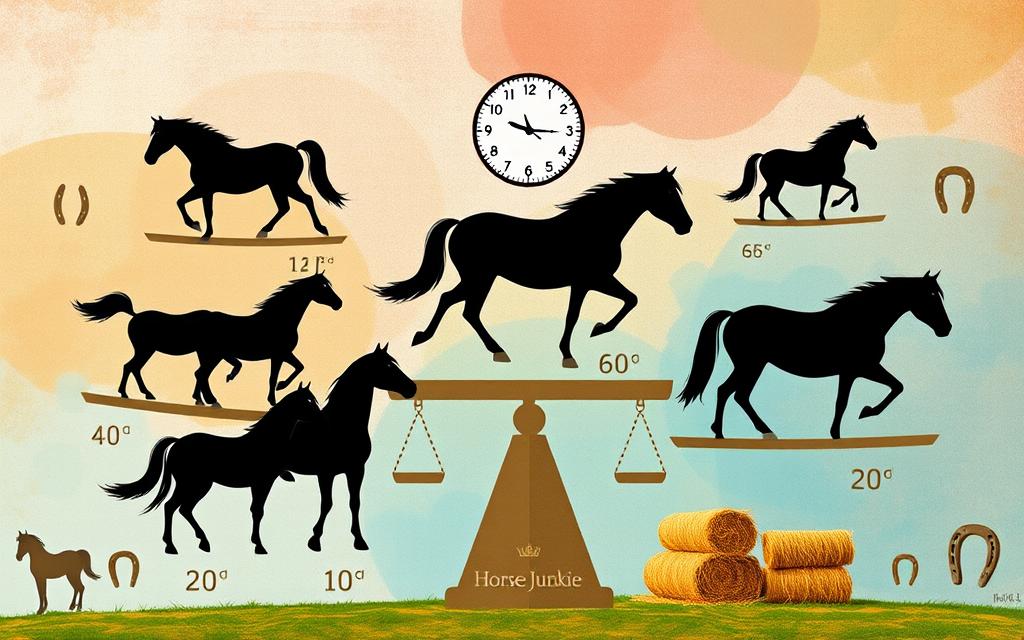Understanding Horse Weight: How Much Do Horses Weigh

Ever thought about how much horses weigh and what affects their size? In the world of horses, knowing their weight is key for their health. Horses can weigh anywhere from 900 to 2,200 pounds. This depends on their breed, age, and health.
This knowledge is vital. It helps us manage their food, exercise, and care. It’s important for their overall well-being.
Genetics, diet, and how active they are also play big roles. Horses’ weights change over their lives. This makes it crucial to keep an eye on their weight regularly.
By learning more about this, we can take better care of our horses. They are amazing animals that deserve our attention and care.
Key Takeaways
- The average weight of a horse typically ranges from 900 to 2,200 pounds.
- Factors influencing horse weight include breed, age, and nutrition.
- Foals experience rapid growth, often doubling their birth weight by adulthood.
- Draft breeds like Clydesdales can weigh up to 2,200 pounds or more.
- Regular monitoring of a horse’s weight is essential for their health management.
Introduction to Horse Weight
Knowing a horse’s weight is key to their health and care. It helps us check their condition, feed them right, and make sure saddles fit. The right weight is important for their performance, health, and happiness.
Importance of Knowing Horse Weight
Knowing a horse’s weight is crucial. It lets us spot health problems early. It also helps them perform better, whether for fun or competitions. Plus, it helps us give them the right food, keeping them healthy.
Ideal Weight for Different Breeds
Horses of different breeds weigh differently. For example, Thoroughbreds usually weigh around 990 pounds. Clydesdales can be much heavier, between 1,650 and 2,205 pounds. Haflinger Miniature horses are the smallest, weighing just over 660 pounds.
Knowing these differences helps us use tools like the horse weight chart. It lets us compare and manage our horses’ health better.
Factors Influencing Horse Weight
Understanding what affects a horse’s weight is key to caring for them. A horse’s weight shows its age, breed, and diet. Knowing how these factors work together helps keep our horses healthy and performing well.
Age and Growth Stages
A horse’s weight changes a lot as it grows. Foals start at 100 to 150 pounds and grow fast in their first year. As they get older, their weight levels out. Good nutrition is vital for this growth.
Breed and Size Variability
Horses of different breeds vary greatly in weight. Thoroughbreds weigh 1,000 to 1,200 pounds, while Arabians are lighter, at 800 to 1,000 pounds. Clydesdales, on the other hand, can be quite heavy, weighing 1,800 to 2,000 pounds. Knowing these differences helps us calculate a horse’s weight correctly.
Nutrition and Diet Impact
Nutrition is crucial for a horse’s weight and health. The right amount and quality of food are important. Too little food can cause health problems, while too much can lead to obesity. By focusing on balanced nutrition, we can manage our horse’s weight and improve their health.

Average Weight of Horses by Breed
Knowing the average weight of horses by breed is key to their health and performance. Horse breeds vary a lot, showing a wide horse weight range. We’ll look at light breeds, heavy breeds, and smaller ponies, showing their average weights.
Light Breeds (e.g., Thoroughbreds)
Light breeds are agile and lighter. Thoroughbreds weigh between 900 and 1,200 pounds. Arabians, another light breed, weigh 794 to 992 pounds. They’re great for many riding styles.
These horses need a balanced diet. They should eat 1.5% to 3% of their body weight each day for health.
Heavy Breeds (e.g., Clydesdales)
Heavy breeds, like Clydesdales and Percherons, are much bigger. Clydesdales weigh 1,808 to 2,006 pounds. Percherons can be even heavier, from 1,874 to 2,425 pounds.
These horses are strong and sturdy. They’re often used for work and draft tasks. They need enough food to support their size.
Ponies and Miniatures
Smaller horses, like ponies and miniature horses, are much lighter. Shetland ponies weigh 353 to 441 pounds. Miniature Horses are even smaller, weighing 88 to 198 pounds.
It’s important to understand their special-needs. They need different care than bigger horses.

Tools for Measuring Horse Weight
Knowing how to measure a horse’s weight is key to keeping them healthy. It’s important to get their weight right to manage their diet and health. There are many tools and methods to help us, from modern technology to old-school methods.
Weight Tapes and Scales
Equine scales are the top choice for measuring horse weight. They give direct and precise measurements. While they can be expensive, their accuracy is unmatched. Weight tapes, on the other hand, are cheaper and simpler to use. They wrap around the horse’s girth but might not account for all factors like fat and muscle.
The traditional way to estimate horse weight is by using a formula. It’s girth x girth x body length ÷ 300. This method is usually within 5-10% of the real weight. But, it might overestimate for some breeds, showing the need to consider breed differences.
Estimating Weight Using Body Condition Score
Body Condition Score (BCS) is another way to guess a horse’s weight. It looks at the horse’s overall look, muscle, and fat. Tools like the BCS tool from Spillers Feed can help calculate this score based on body measurements.
Every horse is different. So, it’s important to use the same methods and tools when measuring. Regular weight checks help manage their weight and keep them healthy for a long time.

Health Implications of Horse Weight
Keeping our horses at the right weight is key for their health. Being too light or too heavy can harm them a lot. We need to think about how weight affects their health, especially if they’re underweight or carrying excess weight.
Underweight Horses and Associated Risks
Underweight horses have big health problems. They often lack nutrients, which weakens their immune system. This makes them more likely to get sick.
It’s important to check their body condition using the Henneke scale. Scores below 4 mean they’re underweight. These horses might get anemia or stomach ulcers, which really lowers their quality of life.
Horses Carrying Excess Weight and Their Health Concerns
Many horses carry excess weight, and this is a big worry. Horses with scores of 7 to 9 on the Henneke scale have serious health issues. These include laminitis and Equine Metabolic Syndrome.
These problems come from too much fat. It can strain their heart and lungs. We need to watch their girth-to-height ratio and neck fat. Cutting down on food and increasing exercise helps keep them healthy.

Weight Management Strategies
Managing a horse’s weight is key for its health and happiness. A good diet and exercise are crucial. This balance keeps our horses fit and prevents obesity-related health problems.
Proper Diet for Weight Control
For a proper diet for weight control, focus on a balanced nutritional plan. Horses should eat about 1.5% of their body weight in hay daily, even when dieting. It’s important to choose high-quality hay to avoid obesity.
For horses carrying excess weight, adding a ration balancer or vitamin/mineral supplement can help. These products support nutrition without adding extra calories. Always consult with a vet or equine nutritionist before changing a horse’s diet.
Exercise Programs for Horses
Exercise programs for horses are essential for weight management. Start with two to three sessions a week, each lasting 20 to 30 minutes. Begin with walking or light trotting and increase intensity as needed.
Regular exercise helps with weight loss and improves muscle tone. It also keeps our horses fit. Adding fun activities to their environment helps during weight management periods. This approach ensures our efforts are effective and considerate of our horses’ needs.
Understanding Body Condition Scoring
Body condition scoring is key for horse owners to check their horse’s health. It rates horses from 1 (poor) to 9 (extremely fat). This helps us understand their health and make better care choices.
Definition and Purpose
The body condition scoring system was created in 1983. It helps us see how much fat and muscle our horse has. It shows if a horse is too thin, just right, or too heavy.
Most horses should be between 4 to 6 on the scale. This ensures they stay healthy and strong.
How to Assess Your Horse’s Condition
To check your horse’s health, look at the neck, withers, back, tailhead, ribs, and shoulders. Seeing how much fat is there tells us a lot. This method helps keep our horse at the right weight and avoids health problems.

Common Misconceptions about Horse Weight
Understanding horse weight is key to good care. Many of us have wrong ideas about horse weight. This can lead to bad care practices. The mix-up between weight and size is common, as not all tall horses are heavy.
Let’s look at some common myths about horse weight to clear things up.
Weight vs. Size: What’s the Difference?
Many think weight equals size. But, a taller horse isn’t always heavier. Breed and body shape play big roles in weight differences. For example:
- Light horses, like Thoroughbreds, weigh between 900 and 1,200 pounds.
- Draft breeds, like Clydesdales, can weigh up to 2,200 pounds.
- A horse’s build affects its weight, leading to weight misconceptions.
Myth-busting Common Weight Assumptions
It’s important to debunk horse weight myths. For instance, many believe heavier horses are healthier. But, too much weight can cause serious health problems, like joint issues and metabolic disorders. Knowing the difference between weight and size helps us see how unique each horse is. When we think about:
- Age, which affects a horse’s growth and health.
- Breed differences, showing how a horse’s ideal weight varies.
- Activity levels that impact weight.
By understanding these misconceptions, we can better care for our horses and keep them healthy.

The Role of Workload in Horse Weight
The impact of workload on a horse’s weight is huge. Regular training keeps them fit and toned. Each equestrian activity has its own way of affecting a horse’s weight, needing special diets and exercise plans.
Impact of Training on Weight
Training changes a horse’s body a lot. Horses do different jobs, like riding for fun or working on farms. This affects their weight in different ways.
For example, 47% of horses in the U.S. are for fun, while 25% work on farms. They have different workloads. A study shows a light riding horse can carry about 20% of its ideal weight. But, some horses can handle more weight better than others.
Breed also plays a big part in how a horse handles weight. This is important to think about when training them.
Weight Requirements for Different Disciplines
Each equestrian discipline has its own weight needs. Thoroughbreds, for racing, need to be lean and fast. Draft breeds, like Clydesdales, are strong for heavy work.
It’s key to watch how a horse’s workload affects its weight and health. A balanced horse can handle more work without getting sore. The right saddle fit is also important to avoid muscle pain. Plus, keeping hooves in good shape helps horses perform better under pressure.

Weight and Riding Performance
Understanding how a horse’s weight affects its performance is key for equestrian activities. The right weight helps horses move efficiently, reducing strain and boosting their athleticism.
Ideal Weight for Optimal Performance
Horses should weigh what’s best for their discipline. For instance, a Thoroughbred needs a weight that supports its speed and agility. Experts suggest horses shouldn’t carry more than 20 percent of their body weight.
This rule is backed by the U.S. Cavalry and studies in the Journal of Equine Veterinary Science. An 800-pound Arabian should not carry over 160 pounds. A 1,000-pound Quarter Horse should not carry more than 200 pounds.
Balancing Weight and Horse’s Physical Capabilities
It’s crucial to balance a horse’s weight with its physical abilities to avoid stress and ensure top performance. Carrying too much weight can lead to muscle soreness, high heart rates, and fatigue. We must also consider the weight of tack and gear.
A Western saddle can weigh nearly 40 pounds. This weight affects how much a rider can carry while following the 20 percent rule.
To keep our horses healthy and performing well, regular checks are essential. Horses ridden with 15 to 20 percent of their body weight for 45 minutes show little stress. However, loads of 25 to 30 percent can harm their performance and cause long-term issues like lameness or changes in gait.
Effective weight management is vital for both rider safety and the horse’s health. It improves our riding experience.
Conclusion: Understanding Our Horses’ Weight
Knowing our horses’ weight is key to their health and performance. We’ve seen how breed, age, and nutrition play a role. A good understanding of horse weight management keeps them healthy.
Recap of Key Points
We’ve covered important points about horse weight. These include:
- Horses’ weights vary by breed. Lighter breeds weigh 800 to 1,200 pounds. Heavy breeds can be 1,500 to 2,000 pounds.
- Nutrition is critical. Horses need 1-2% of their body weight in food daily, based on age and activity.
- Checking weight and body condition score regularly helps us adjust their diet and exercise.
Importance of Regular Monitoring
Keeping an eye on our horses’ weight is crucial. It helps prevent health problems from weight issues. By monitoring their weight, we can adjust their diet and exercise on time. This keeps our horses healthy and happy.
Additional Resources on Horse Weight Management
Looking to improve our knowledge on horse weight management? There are many helpful resources available. Guides on equine nutrition and health from well-known vets are a great place to start. These books offer valuable insights into keeping our horses at the right weight.
Recommended Reading and Guides
Veterinary resources for owners are also key. Working with vets and nutritionists gives us custom advice and diets for our horses. Regular check-ins help us keep up with the latest in weight management.
Veterinary Resources for Horse Owners
Online platforms focused on equine care are also valuable. They provide tips on tracking weight, like fat scoring and weigh taping. These tools help us spot any changes in our horses quickly. With these resources, we can better manage our horses’ weight and keep them healthy.
FAQ
How much do horses weigh on average?
What is the ideal weight for different horse breeds?
How can we calculate a horse’s weight?
What factors contribute to a horse’s weight variations?
How does a horse’s workload affect its weight?
What are the health implications of being underweight or carrying excess weight?
How often should we monitor a horse’s weight?
What are common misconceptions about horse weight?
What role does nutrition play in horse weight management?
What tools are recommended for measuring a horse’s weight?
How does a horse’s size impact its weight?
Source Links
- How Much Does a Horse Weigh?
- How Much Does a Horse Weigh? — The Equine Institute
- Horse Height & Weight: A Guide
- How Much Does a Horse Weigh? | Strathorn Farm Stables
- How much does a horse weigh? (Fun facts, calculator, FAQs)
- HotBot
- Managing your horse’s weight
- How Much Does a Horse Weigh? With Breed Chart | PangoVet
- How much does a horse weigh?
- How Much Does a Horse Weigh? Find Out Now!!!
- Learn to Calculate a Horse’s Approximate Weight
- How to Weigh a Horse (Easy Step-by-Step Guide) – Horse Rookie
- How Do I Weigh My Horse?
- Weight: is your horse the right weight? – World Horse Welfare
- Top Tips for Safe Equine Weight Loss
- Equine Weight Management
- The Body Condition Score
- Horse Body Condition Scoring | Purina Animal Nutrition
- Condition scoring and weight estimation of horses
- A Comprehensive Guide on How Much Does A Horse Weigh
- How much does a horse weigh?
- How Much Does My Horse Weigh?
- Guidelines for weight-carrying capacity of horses
- Horses at Work: Lifestyles of Working and Service Horses
- Limit the Load: how much can horses carry? — Jec Ballou Equine Fitness & Performance
- THE EFFECT OF RIDER WEIGHT ON HORSES – AN ARTICLE BY FITNESS FOR POLO
- How Much Weight Can Horses Comfortably Carry?
- How to Measure a Horse’s Height & Weight in 3 Easy Ways
- How Heavy Is A Full-Grown Horse? [Stats About How Much Horses Weigh]
- Weight: is your horse the right weight? – World Horse Welfare
- Helping your pony lose weight



